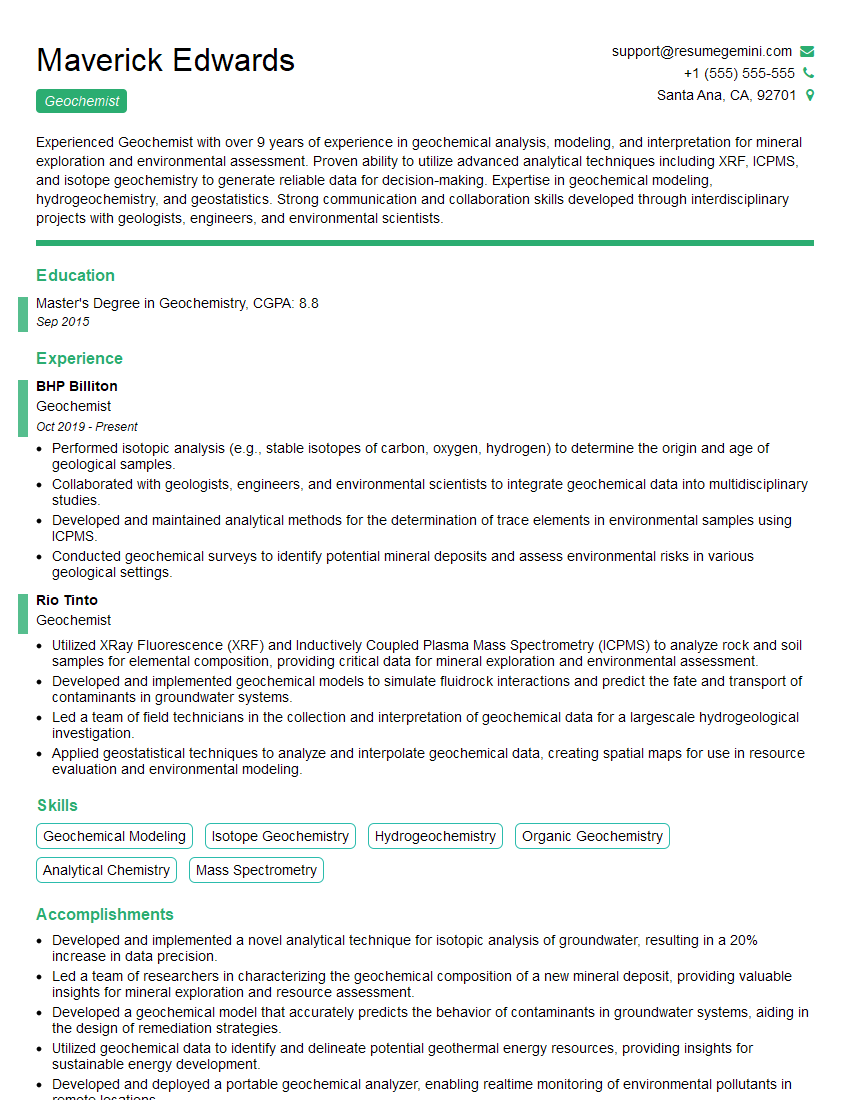Are you a seasoned Geochemist seeking a new career path? Discover our professionally built Geochemist Resume Template. This time-saving tool provides a solid foundation for your job search. Simply click “Edit Resume” to customize it with your unique experiences and achievements. Customize fonts and colors to match your personal style and increase your chances of landing your dream job. Explore more Resume Templates for additional options.

Maverick Edwards
Geochemist
Summary
Experienced Geochemist with over 9 years of experience in geochemical analysis, modeling, and interpretation for mineral exploration and environmental assessment. Proven ability to utilize advanced analytical techniques including XRF, ICPMS, and isotope geochemistry to generate reliable data for decision-making. Expertise in geochemical modeling, hydrogeochemistry, and geostatistics. Strong communication and collaboration skills developed through interdisciplinary projects with geologists, engineers, and environmental scientists.
Education
Master’s Degree in Geochemistry
September 2015
Skills
- Geochemical Modeling
- Isotope Geochemistry
- Hydrogeochemistry
- Organic Geochemistry
- Analytical Chemistry
- Mass Spectrometry
Work Experience
Geochemist
- Performed isotopic analysis (e.g., stable isotopes of carbon, oxygen, hydrogen) to determine the origin and age of geological samples.
- Collaborated with geologists, engineers, and environmental scientists to integrate geochemical data into multidisciplinary studies.
- Developed and maintained analytical methods for the determination of trace elements in environmental samples using ICPMS.
- Conducted geochemical surveys to identify potential mineral deposits and assess environmental risks in various geological settings.
Geochemist
- Utilized XRay Fluorescence (XRF) and Inductively Coupled Plasma Mass Spectrometry (ICPMS) to analyze rock and soil samples for elemental composition, providing critical data for mineral exploration and environmental assessment.
- Developed and implemented geochemical models to simulate fluidrock interactions and predict the fate and transport of contaminants in groundwater systems.
- Led a team of field technicians in the collection and interpretation of geochemical data for a largescale hydrogeological investigation.
- Applied geostatistical techniques to analyze and interpolate geochemical data, creating spatial maps for use in resource evaluation and environmental modeling.
Accomplishments
- Developed and implemented a novel analytical technique for isotopic analysis of groundwater, resulting in a 20% increase in data precision.
- Led a team of researchers in characterizing the geochemical composition of a new mineral deposit, providing valuable insights for mineral exploration and resource assessment.
- Developed a geochemical model that accurately predicts the behavior of contaminants in groundwater systems, aiding in the design of remediation strategies.
- Utilized geochemical data to identify and delineate potential geothermal energy resources, providing insights for sustainable energy development.
- Developed and deployed a portable geochemical analyzer, enabling realtime monitoring of environmental pollutants in remote locations.
Awards
- Received the Geochemical Societys Young Scientist Award for outstanding research in geochemical modeling.
- Recognized by the American Geophysical Union with the Early Career Scientist Award for contributions to understanding carbon cycling in the Earths crust.
- Honored with the International Association of GeoChemistrys Geochemical Achievement Award for innovative research on the role of fluids in geological processes.
- Recipient of the Geological Society of Americas Young Investigator Award for groundbreaking research on the geochemistry of volcanic systems.
Certificates
- Certified Professional Geologist (CPG)
- Certified Geochemist (CG)
- Professional Geologist License (PGL)
- American Chemical Society (ACS) Certified Geochemistry Professional
Career Expert Tips:
- Select the ideal resume template to showcase your professional experience effectively.
- Master the art of resume writing to highlight your unique qualifications and achievements.
- Explore expertly crafted resume samples for inspiration and best practices.
- Build your best resume for free this new year with ResumeGemini. Enjoy exclusive discounts on ATS optimized resume templates.
How To Write Resume For Geochemist
- Highlight your expertise in geochemical analysis techniques, such as XRF, ICPMS, and isotope geochemistry.
- Demonstrate your ability to interpret geochemical data and develop geochemical models to solve complex problems.
- Emphasize your experience in field data collection and management, as well as your ability to work independently and as part of a team.
- Showcase your communication and collaboration skills through examples of successful projects involving interdisciplinary collaboration.
- Stay up to date with the latest advancements in geochemistry and be prepared to discuss your knowledge during interviews.
Essential Experience Highlights for a Strong Geochemist Resume
- Collected and analyzed rock and soil samples using XRF and ICPMS to determine elemental composition for mineral exploration and environmental assessment.
- Developed and implemented geochemical models to simulate fluid-rock interactions and predict the fate and transport of contaminants in groundwater systems.
- Led a team of field technicians in the collection and interpretation of geochemical data for a large-scale hydrogeological investigation.
- Applied geostatistical techniques to analyze and interpolate geochemical data, creating spatial maps for use in resource evaluation and environmental modeling.
- Performed isotopic analysis (e.g., stable isotopes of carbon, oxygen, hydrogen) to determine the origin and age of geological samples.
Frequently Asked Questions (FAQ’s) For Geochemist
What is the role of a Geochemist?
A Geochemist analyzes the chemical composition of rocks, minerals, water, and soil to understand geological processes, identify mineral deposits, assess environmental risks, and solve problems related to the Earth’s systems.
What are the educational requirements to become a Geochemist?
A Master’s Degree in Geochemistry or a related field, such as Geology, Environmental Science, or Chemistry, is typically required to work as a Geochemist.
What skills are important for a Geochemist?
Geochemists need strong analytical skills, knowledge of geochemical techniques, experience in data analysis and modeling, and excellent communication abilities.
What industries employ Geochemists?
Geochemists are employed in various industries, including mining, environmental consulting, government agencies, and academia.
What is the job outlook for Geochemists?
The job outlook for Geochemists is expected to be good, as there is a growing demand for professionals with expertise in geochemistry for mineral exploration, environmental assessment, and climate change studies.
How can I become a certified Geochemist?
There are various professional organizations that offer certification programs for Geochemists, such as the American Institute of Professional Geologists (AIPG) and the Society of Exploration Geophysicists (SEG).